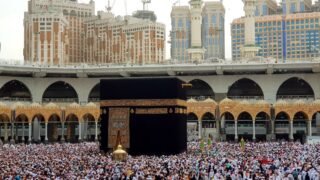Are life and the Hereafter enemies? Does seeking worldly affairs affect one’s destiny in the Hereafter? Or are life and the Hereafter two faces of the same coin? Can a Muslim balance between them? Islam is about moderation in all affairs whether religious or worldly. God created us with a purpose in this life. God created us to acknowledge His oneness and to worship Him alone. If we understand the main objective of creating human beings, we will recognize the importance of exerting every possible effort to worship God the proper way.
On the other hand, one has to work to earn his living. One has to interact with others. One has to go here and there. Then, what should one do? Should one isolate himself and live in a ghetto?
No, Islam is not against interaction. Islam does not accept the renunciation of this world. Interaction is not a crime, quite the opposite, as Islam calls for involvement, struggle and change.
A true believer should be involved in worldly affairs by commanding good, forbidding evil, and establishing justice on earth. A Muslim should be an active member in society.
We read in the Quran the story of Qarun, who was of Prophet Moses’s people, that he was warned by the godly men among his people:
{Seek instead, by means of what God has granted you, [the good of] the life to come, without forget¬ting, your own [rightful] share in this world; and do good [unto others] as God has done good unto you; and seek not to spread corruption on earth: for, verily, God does not love the spreaders of corruption!} (Al-Qasas 28: 77)
This is exactly what is required from a Muslim; i.e. to strike a balance between his religious and worldly affairs. The question is how to strike this balance?
Managing time is the key for success. If you manage your time correctly, you can do everything you want. You first have to set your list of priorities, starting with the most important, then the less important. You should make the best use of every second in your life. On your way to work or on your way back home, you can turn good deeds into acts of worship. For example, you can read the Quran, remember God, seek His forgiveness while you are on the bus or the train.
We have a good example in the life of Prophet Muhammad (peace be upon him). Lady Aisha was once asked:
“What did the Prophet use to do in his house?” She replied: “He used to keep himself busy serving his family, and when it was time for prayer he would go out for it.” (Al-Bukhari, 676)
The Prophet used to help his wives with the housework; this is a worldly affair. However, when the time of prayer came he left everything and went to the mosque to offer the prayer.
Indulging in worldly affairs without paying heed to religious obligations is not recommended in Islam. God says about those people what means: {… whereas they who are bent on denying the truth shall have – even though they may enjoy their life [in this world] and eat as cattle eat – the fire [of the hereafter] for their abode.} (Muhammad 47: 12)
New Muslims might think that in their transition period they should abandon everything in this life and focus only on strengthening their relation with God. They are right in seeking a strong connection with God. However, they are not right in rejecting this life. The following hadith explains the course of action that the Prophet adopted.
Narrated Anas bin Malik:
A group of three men came to the houses of the wives of the Prophet asking how the Prophet worshipped (Allah), and when they were informed about that, they considered their worship insufficient and said:
“Where are we from the Prophet as his past and future sins have been forgiven.”
Then one of them said:
“I will offer the prayer throughout the night forever.”
The other said:
“I will fast throughout the year and will not break my fast.”
The third said:
“I will keep away from women and will never marry.”
Allah’s Apostle came to them and said:
“Are you the same people who said so-and-so? By Allah, I am more submissive to Allah and more afraid of Him than you; yet I fast and break my fast, I do sleep and I also marry women. So he who does not follow my tradition in religion, is not from me (not one of my followers).” (Al-Bukhari, 5063)
This is the moderate approach that should be followed by Muslims whether they are new or born Muslims. Extremism and negligence are rejected in Islam.
There are many Quranic verses that make it clear that a Muslim should not burden himself with what he cannot do: {God does not burden any human being with more than he is well able to bear.} (Al-Baqarah 2: 286)
{Remain, then, conscious of God as best you can, and listen [to Him], and pay heed.} (At-Taghabun 64: 16)
The Prophet is reported to have said:
“… if I forbid you to do something, then keep away from it. And if I order you to do something, then do of it as much as you can.” (Al-Bukhari, 7288)
Lady Aisha said:
“Once the Prophet came while a woman was sitting with me. He said:
“Who is she?”
I replied:
“She is so and so,” and told him about her (excessive) praying. He said disapprovingly:
“Do (good) deeds which is within your capacity (without overtaxing yourself) as Allah does not get tired (of giving reward) but (surely) you will get tired; the best deed (act of Worship) in the sight of Allah is that which is done regularly.” (Al-Bukhari, 43)
These are the guidelines that should be followed. A mid-ground approach will help us grow in faith in this world in a sustained way, and lead to great rewards in the Hereafter.
By Mohsen Haredy

















